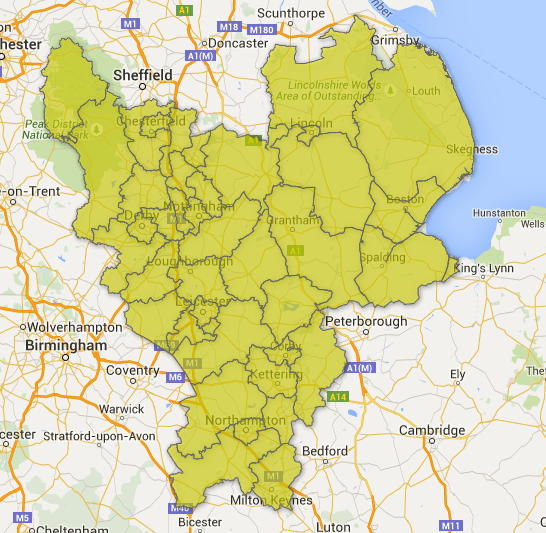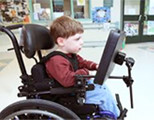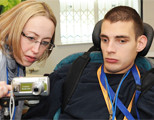Communication Aids (AAC)
Alternative and Augmentative Communication (AAC) or Communication aids are devices which can enable those who have lost the ability to speak, or have not developed speech, to communicate.
The EAT AAC service works with local services AAC Services to provide specialist communication aids in the East Midlands Region.
Eligibility
The Alternative and Augmentative Communication Aid Service provides a specialist communication aid service to people whose GP is located in Nottinghamshire (excluding Bassetlaw), Derbyshire, Leicestershire & Rutland, Lincolnshire, Northamptonshire or Milton Keynes. Anyone is able to refer, but their referral must be accompanied by a report from a speech and language therapist – if this service is not available in your area please contact us for advice on your local service.

EATS will be able to provide a specialised assessment if the patient has:
- A severe / complex communication difficulty associated with a range of physical, cognitive, learning or sensory deficits
- A clear discrepancy between their level of understanding and their ability to speak
In addition the patient must:
- Be able to understand the purpose of a communication aid (be an intentional communicator)
- Have developed beyond cause and effect understanding
We understand that these criteria may be difficult to assess and would encourage anyone who is unsure to contact EATS in the first instance. You can also refer to this eligibility flowchart produced by NHS England to determine whether the person requires a specialist or local service. If a patient does not meet these criteria, please contact your local AAC team. If your local AAC team is unable to meet this need, you may wish to consider our training service.
Systems Provided
The EAT AAC Service can provide a wide variety of communication aids both symbol and alphabet based and ranging from early intentional communicators with a limited range of language to adults who are able to spell and form sentences using the alphabet. The devices we provide can be accessed in a variety of ways including adapted touch, switches, eye gaze, head mice and sip and puff mice.
Referrals
You can make a referral for either an assessment or equipment only referral. If you are unsure whether the person you are working with meets the criteria or if you are not sure exactly which device you are looking to be provided with we would recommend an assessment referral. Each referral is individually triaged at a fortnightly meeting which usually occurs on a Thursday. You will be informed of the outcome of the meeting. We aim to inform you of the result within 3 working days of the triage meeting.
What to expect – assessment appointments
An appointment will be made to assess the person requiring AAC in the environment which best reflects their needs. This may be their school, home, day centre etc. but will be agreed with the referrer and the individual. Healthcare professionals from the team will attend to contribute to the assessment, this may include:
- Speech and Language Therapist
- Occupational Therapist
- Clinical Scientist
- Clinical Technologist
- Therapy / Technology Assistants
The team which attends will be dependent on the individuals needs and you will be informed before the date who will be attending.
A member of the local AAC team is also expected to attend, this is usually the speech and language therapist, but could also be a teacher, occupational therapist etc. The local AAC team will be responsible for ongoing AAC work with the individual and therefore it is vital that they attend. Assessment appointments will not proceed without a member of the local AAC team.
The team will complete a comprehensive assessment of the person which may include (but is not limited to):
- Discussion with carers
- Trial of a number of devices
- Trial of a number of types of accessing devices
- Assessment of the person’s language, functional use, social use and compensatory strategies
Appointments can take up to three hours to complete. You will be contacted prior to ensure any needs of the individual are taken into account.
Recommendations will then be made as to how a communication aid can be used with the person. This may also include recommending low tech or other partner assisted approaches. If a device is recommended, provision of the prescribed device can be completed through the EAT Service
What to expect – equipment only requests
Equipment only requests will only be accepted if there is a clear description of how the person meets the service specification including SLT assessment AND if there is evidence that more than one device has been trialled or considered (including the reasons for ruling out devices). Equipment only requests are expected to be implemented and supported by the local AAC Team and as such, equipment is delivered to the referrer for implementation. Equipment only requests are completed to the referrers specification and therefore any additional voices are peripherals need to be specified on the original referral. The EAT Service remain responsible for yearly checks on the device to ensure its safety.
Referral Forms
 |
 |
| Assessment Referral Form | Equipment Only Referral form |





